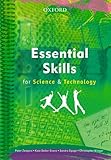Essential skills for science & technology / Peter Zeegers ... [et al.].
Material type: TextPublication details: Victoria, Australia ; New York : Oxford University Press, 2008.Description: xxiv, 256 p. : ill. ; 25 cmISBN:
TextPublication details: Victoria, Australia ; New York : Oxford University Press, 2008.Description: xxiv, 256 p. : ill. ; 25 cmISBN: - 0195558316
- Essential skills for science and technology
- 507.11 22
| Item type | Current library | Call number | Copy number | Status | Date due | Barcode | |
|---|---|---|---|---|---|---|---|
 Books
Books
|
Main library General Stacks | 507.11 / ZE.E 2008 (Browse shelf(Opens below)) | 1 | Available | 004361 |
Browsing Main library shelves, Shelving location: General Stacks Close shelf browser (Hides shelf browser)

|
No cover image available No cover image available |

|

|

|

|

|
||
| 503 PA.M / 1998 McGraw-Hill concise encyclopedia of science & technology / | 507 / WI. A 2009 أكبر خمس مشكلات في العلوم | 507.1073 / LE.S 2006 Science education and student diversity : | 507.11 / ZE.E 2008 Essential skills for science & technology / | 507.2 / OL.S 2008 Scientific collaboration on the Internet / | 508 / FI. 2007 501 must-visit natural wonders. | 508.092 DA.V / 1989 Voyage of the Beagle : |
Includes bibliographical references (p. [241]-245) and index.
Preface About the authors You And Tertiary Study The first step Being organised Teaching Learning And Researching Modes of learning for higher education Lectures, tutorials, and laboratories E-learning and researching Assessments Critical Evalutaion Reading scientific literature Critical thinking Academic argument Writing and Presenting in the Sciences Academic integrity Referencing styles Writing for the sciences Report writing Laboratory reports Writing an article review Presentation skills: talks and posters Editing your writing Quantitative Methods An approach to problem solving Fundamental mathematics An introduction to calculus Basic statistics Bibliography Electronic Resources Key Words in Written Assignments Unusual Plurals Prefixes The use of the apostrophe International System of units and fundamental constants Index
The essential guide for any student studying science or technology. This book introduces the core academic skills students in this area need to learn & apply to succeed at university. It focuses on three key skills areas- research, argumentation and critical analysis; quantitative methods; and the conventions of written and oral communication. It explains how to read scientific literature and understand its different language style, terminology, data and argument analysis. And conflicting interpretations. Next, the book tackles how to take data from a range of sources to construct your own perspective on a scientific issue & how to present it in both written & oral forms. Lastly it assists with one of the most fundamental of all tools for any branch of science- an understanding of the basic laws of mathematics. Key topics include an introduction to tertiary study, e-learning & assessment; reading scientific literature, thinking & arguing critically; writing, research and presenting; and quantitative methods including fundamental mathematics, calculus, problem solving and statistics. Focused on step-by-step skills development, this book aims to help readers become better students who are more likely to succeed.
1
There are no comments on this title.
